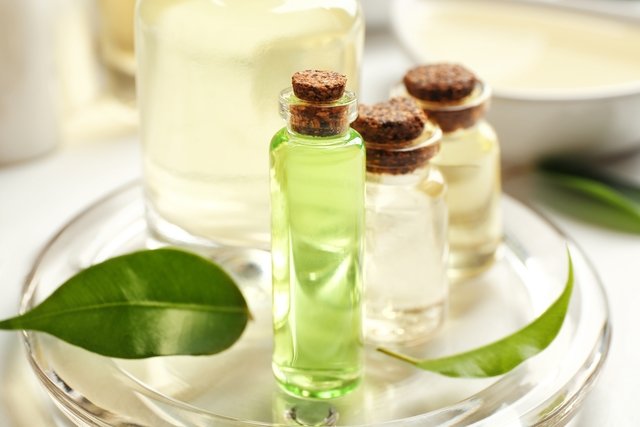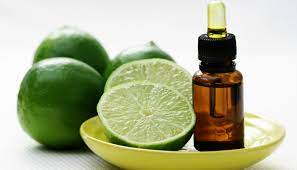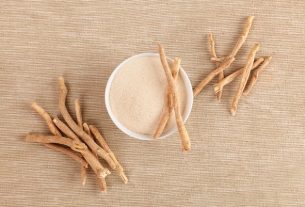Tea tree oil is extracted from the plant Melaleuca alternifoliaalso known as tea tree or tea tree, e It has been used since ancient times to treat various health problems, due to its diverse medicinal properties, which have been proven in several scientific studies.
Tea tree oil has antiseptic, antifungal, parasiticidal, germicidal, antibacterial and anti-inflammatory properties, making it an excellent natural option for disinfecting wounds, improving acne or treating nail fungus, for example.
The benefits of tea tree oil have been observed when applied to the skin, should not be ingested orallyas it can cause poisoning.

What is it for
The main benefits of using tea tree oil (tea tree) they are:
1. Disinfect wounds
Due to its bactericidal properties, tea tree oil is very effective in eliminating bacteria such as E. coli, S. pneumoniae, H. influenzae, S. aureus or other bacteria that can cause infections through open wounds. Furthermore, it also appears to accelerate healing and reduce local inflammation.
How to use: Mix a drop of the oil with a tablespoon of almond oil and apply a small amount of this mixture to the wound and cover with gauze. This procedure can be repeated once or twice a day until complete healing.
2. Improve acne
Tea tree reduces acne due to its anti-inflammatory properties and ability to inhibit the growth of bacteria, such as Propionibacterium acnes, the bacteria that causes acne.
How to use: You can use a gel or fluid with tea tree in the composition, or mix 1 mL of tea tree oil in 9 mL of water and apply the mixture to the affected regions, 1 to 2 times a day.
3. Treat nail fungus
Due to its fungicidal properties, tea tree oil helps treat nail fungus and can be used alone or in combination with other remedies.
How to use: Mix 2 or 3 drops of tea tree oil in a vegetable oil such as almond or coconut oil and apply to the affected nails.
4. Eliminate excess dandruff
Tea tree oil is very effective in treating dandruff, improving the appearance of the scalp and also calming itching.
How to use: There are shampoos in the pharmacy that have tea tree oil in their composition that can be used daily. Furthermore, you can also add a few drops of this oil to a regular shampoo and use it every time you wash your hair.
5. Repel insects
This oil can also be used as an insect repellent, and may be even more effective than pharmacy products that have DEET in their composition. Furthermore, it can also be used to prevent lice infestation or to help eliminate them, and it also relieves the itching caused by these parasites.
How to use: To ward off insects, you can make a spray by mixing tea tree oil with other essential oils, such as lavender or citronella, for example, and diluting it in almond oil. In the case of lice, you can add around 15 to 20 drops of tea tree oil to your usual shampoo and then use it by gently massaging the scalp with your fingertips.
6. Treating athlete’s foot
Athlete’s foot is a fungal infection that is difficult to treat, even with the use of antifungal medications. Complementing the treatment with tea tree oil can help improve results and shorten the treatment. Furthermore, it also improves the symptoms of the infection, such as itching and inflammation.
How to use: Mix half a cup of arrowroot powder and half a cup of baking soda and add about 50 drops of tea tree oil. This mixture can be applied once or twice a day.
7. Prevent bad breath
Tea tree oil helps fight microorganisms that cause cavities and bad breath, due to its antiseptic and antibacterial properties.
How to use: To make a homemade elixir, simply add a drop of tea tree oil to a cup of warm water, mix and swish for about 30 seconds.
8. Help in the treatment of genital infections
Tea tree oil can also be used to help treat genital infections, such as candidiasis, bacterial vaginosis or trichomoniasis, due to its antimicrobial properties, helping to alleviate symptoms and speed up recovery. However, the use of tea tree oil does not replace the treatment recommended by your doctor.
How to use: Tea tree oil can be diluted with another oil, such as almond oil, for example, and applied to the genital region. Learn how to prepare tea tree oil for genital application.
Possible side effects
Tea tree oil is generally well tolerated, however, although rare, side effects such as skin irritation, allergic reactions, itching, burning, redness and dryness of the skin may occur.
This oil is toxic if ingested and can cause confusion, difficulty in controlling muscles and making movements and can also cause decreased consciousness.
When not to use tea tree oil
Tea tree oil should only be used externally and should not be ingested as it can be toxic orally. Furthermore, when used on the skin, it must be diluted, especially for people with sensitive skin, to avoid skin irritation.

Sign up for our newsletter and stay up to date with exclusive news
that can transform your routine!
Warning: Undefined array key "title" in /home/storelat/public_html/wp-content/plugins/link-whisper-premium/templates/frontend/related-posts.php on line 12
Warning: Undefined array key "title_tag" in /home/storelat/public_html/wp-content/plugins/link-whisper-premium/templates/frontend/related-posts.php on line 13



